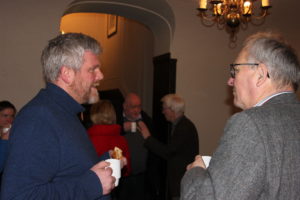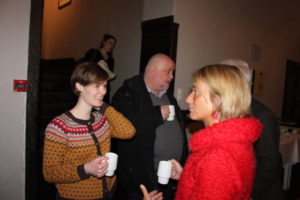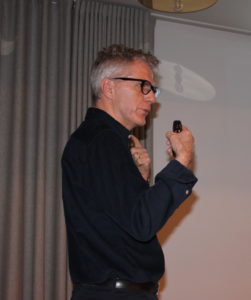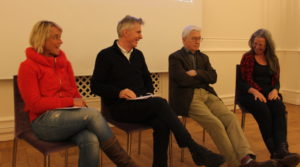
- Beklager. Denne hendelse har allerede funnet sted.
Seminar utsatt på ubestemt tid: Research and Practice – Hand in Hand? Seminar with POLYFON’s Scientific Advisory Committee
NB! Grunna korona-situasjonen må vi – i tråd med UiBs retningslinjer – utsetja dette seminaret. Vi vil på eit seinare tidspunkt koma tilbake med ny dato.
_____________________________________________________________________
POLYFON Knowledge Cluster for Music Therapy organizes an open seminar with its Scientific Advisory Committee. The focus this year is how to make collaborations between researchers, practitioners, and participants as smooth and mutually beneficial as possible. What are the ethical and practical pitfalls, and what are the possibilities for development of new knowledge and better practice?
Each presentation will be short, followed by input from the Scientific Advisory Committee and reflection and discussion among the participants in the seminar.
Time: March 31, from 9AM to 1.30PM, including lunch.
Place: Grand Hotel Terminus
It is a free seminar, but you need to register before March 24: Please register here.
Program
08.30-09.00: Coffee, fruits and conversations
09.00-09.10: Introduction
09.10-09.50: Kjetil Vikene, University of Bergen: Parkinson’s Disease and Music Therapy Research: Do Researchers and Patients Want the Same Thing?
09.50-10.30: Felicity Baker, University of Melbourne: Engaging and Sustaining Industry Partners in a Randomised Controlled Trial Delivered in Residential Care Homes
10.30-10.50: Coffee break
10.50-11.30: Ann Kristin Meberg & Malena Ottesen, Øyane District Psychiatric Center: Integration of Music Therapy and Mentalization Based Treatment (MBT) for People with Emotional Unstable Personality Disorder
11.30-12.20: Nina Bolstad & Kaja Elise Åslid Enge, Municipality of Bergen: Implementation of Music Therapy in Mental Health Services for Children and Families in the Municipality of Bergen
12.20-12.30: Summary
12.30-13.30: Lunch
Abstracts
Parkinson’s Disease and Music Therapy Research: Do Researchers and Patients Want the Same Thing?
Kjetil Vikene, Post-doc, University of Bergen
Based on previous research, collaborators at the University of Bergen are now embarking on a larger study on music therapy and Parkinson’s disease. The project is then a collaboration in the crossroads between cognitive neuroscience, neurology and music therapy. For researchers, Parkinson’s disease offers a unique possibility to investigate phenomena related to timing, rhythm and movement, because of the specific pathology and the symptoms manifest in the disease. Due to neurodegeneration in the basal-ganglia, a region crucial for the processing of rhythm and regularities as well as a crucial component in voluntary movement, the disease has become a model to investigate timing and movement difficulties. New research is also investigating the connection between musical rhythm processing and other cognitive challenges in the disease such as working memory and attention, is promising. The question is: Promising for whom? Do patients participating in such interventions agree with the research-questions? Do they see the use-value of any results? How well does rhythm research in Parkinson’s disease correspond with the self/subjective perception of the disease and its challenges?
Engaging and Sustaining Industry Partners in a Randomised Controlled Trial Delivered in Residential Care Homes
Felicity Baker, Professor and Head of musik therapy, University of Melbourne
Engaging and sustaining partnerships with stakeholders is always challenging for researchers when research is the core business of an academic but not so for most stakeholders we engage with. Felicity will provide an overview of how she established and sustained partnerships with key aged care service providers to ensure the Australian arm of the MIDDEL study was rolled out as smoothly as possible and to maintain positive “research team” – “care home team” relationships. Felicity will present strategies used as well as share some of the challenges encountered.
Integration of Music Therapy and Mentalization Based Treatment (MBT) for People with Emotional Unstable Personality Disorder
Ann Kristin Meberg, Psychologist & Malena Ottesen, Music therapist, both Øyane District Psychiatric Center
Project leader: Agnete Fossbakk, Head of research, Øyane District Psychiatric Center
We will present a project where we integrate music therapy and mentalization-based therapy for a patient group that struggles to participate in regular MBT therapy. Mentalization-based treatment is evidence-based treatment for persons with personality disorders. Clinical experience indicates that some patients are unable to attend treatment. We assume that this is about impaired cognitive function, reading and writing difficulties, negative experiences from school situations, dissociation / voice hearing, or significant anxiety / emotion regulation difficulties in groups. The original manual as designed for the psychoeducational group has not taken these types of challenges into account. The MBT psychoeducational group is set up as regular classroom tuition and lasts for two hours with a 15 min break. In the music therapy group, we use lyrics, music, and simple illustrations to make the MBT material accessible for everyone, and to engage patients who do not complete the MBT psychoeducational course in its original format. The group lasts for one hour. Participants in the group have the opportunity to choose music for listening or participate in singing and playing songs. We practice mentalizing when we talk about what happens in the characters in the lyrics and in ourselves as we listen, and play, and link the themes up to the MBT manual. In MBT music therapy, we repeat topics from the manual several times. We do this to make sure that patients do not miss anything even though they may not be able to attend each session. Another aspect of repeating topics is to make sure everyone gets enough time to understand. This is a pilot project, we still struggle with making the group safe and accessible enough for the patient group described.
Implementation of Music Therapy in Mental Health Services for Children and Families in the Municipality of Bergen
Nina Bolstad, leader of Avdeling for kunnskapsutvikling, Etat for barn og familie, Municipality of Bergen & Kaja Elise Åslid Enge, Music therapist, Etat for barn og familie, Municipality of Bergen
“Barne- og familiehjelpen” – the Children and Family Aid – in the municipality of Bergen is a low-threshold mental health service that provides counselling and therapy for children and families that experiences mental health difficulties or difficulties within the family. The services are easily accessible without the need for referrals, and families can contact the offices themselves to receive help.
This presentation will focus on the process of developing and implementing music therapy in the Children and Family Aid. We will present political and bureaucratic plans and processes ahead of the decision to have music therapy, as well as how these shape the music therapy service. Further on, we will talk about how we choose in which situations and to which populations music therapy are to be offered, an outline of the music therapy service, as well as interdisciplinary collaboration and collaboration with the research community in Bergen.
Members of POLYFON´s Scientific Advisory Committee
Tia DeNora, Professor of Sociology of Music, University of Exeter, UK.
Lars Lien, Leader of the Norwegian National Advisory Unit on Concurrent Substance Abuse and Mental Health Disorders (ROP).
Katrina McFerran, Professor of Music Therapy, University of Melbourne, Australia.
Peter Tyrer, Emeritus Professor of Community Psychiatry, Imperial College, London.





